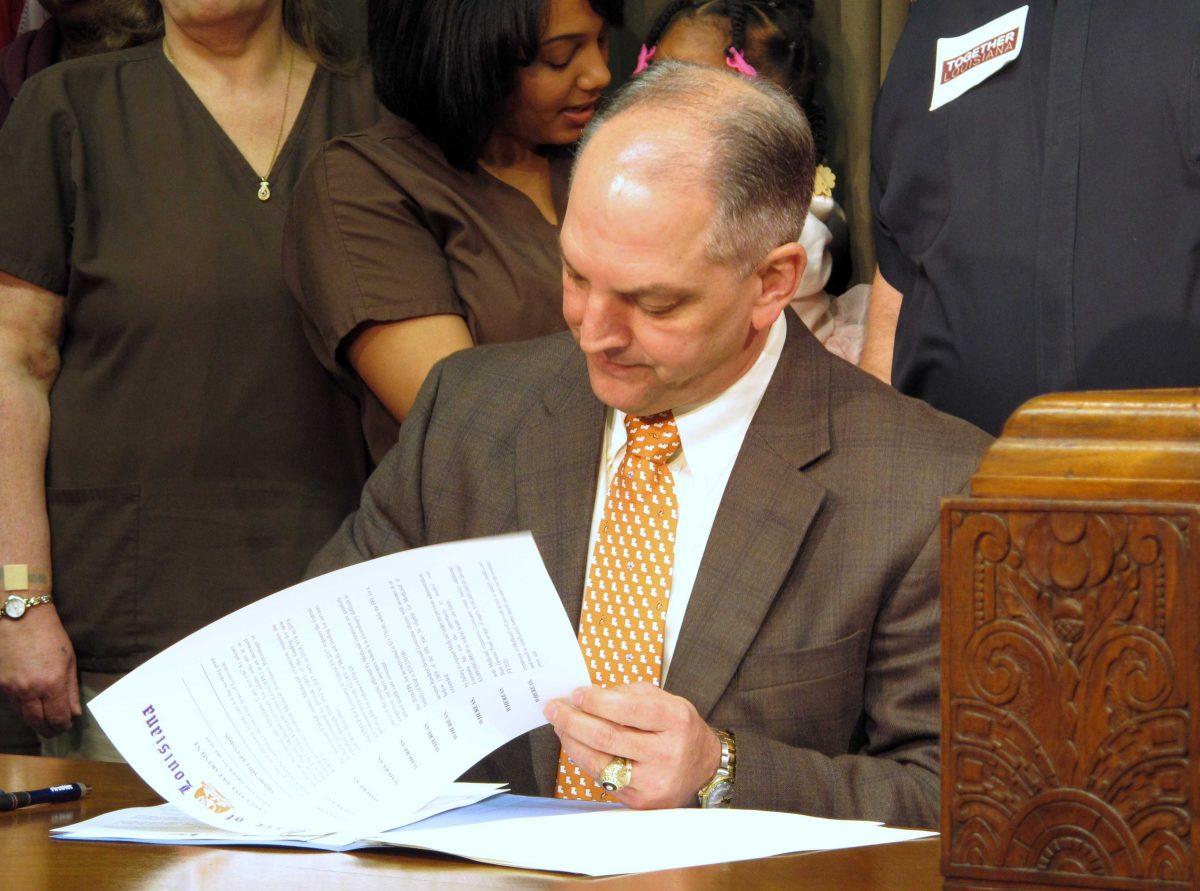Wayne Parent, a political science professor who teaches courses on Louisiana politics, said over the 32 years he’s been teaching, his classes have become more liberal. “A lot,
actually,” he said.
“It’s not that they’re that liberal, it’s that they used to be incredibly conservative,” he added.
Parent began teaching during the Reagan years. He attributes the change in students’ ideology mostly to technology changes, where students now can live in a deeply conservative area like Louisiana, but connect to like-minded people all over the country.
But his class trends haven’t mirrored the political shifts in Louisiana, where the Republican “takeover,” seems complete.
Staring across a partisan aisle that had grown wider, and shifted further to the right, during his time as a state
representative from small-town Amite, Gov. John Bel Edwards defied conventional wisdom when he won the governorship in November 2015. Now his party hopes to shift the balance to the left and capitalize on a major victory in a conservative state.
The Democrat, who waltzed into a runoff after a mud-slinging primary campaign among the three major Republican candidates in October, trounced U.S. Sen. David Vitter on his way to the governor’s mansion. He was sworn in Monday during an inauguration ceremony at the Capitol, and Edwards hawked bipartisanship, while laying out liberal economic policy plans.
“I think it’s really exciting,” said Executive Director of the Louisiana Democratic Party Stephen Handwerk. “There are a lot more people paying attention and getting involved.”
Edwards’ win, in a race many thought was shored up by Vitter in the early going, soothed a Louisiana Democratic Party ailed by widespread losses in state elections and the “horrible” loss of Mary Landrieu in the 2014 U.S. Senate race, Handwerk said.
Approaching Louisiana’s presidential primary election on March 5, the state finds itself more in the national spotlight. Texas Sen. and presidential candidate Ted Cruz rallied supporters in Baton Rouge on Monday and President Barack Obama is set to visit McKinley Senior High School Thursday.
Louisiana is a far cry from the swing state Bill Clinton carried in the ‘90s, Parent said, but the state’s red hue differs from other Deep South states like Mississippi and Alabama.
The Pelican State was one of the last havens for Democrats holding out in the South, said Parent, who teaches courses on Louisiana politics. He posed an essay question to his political science students after the race was won: given similar circumstances, would a Democrat have won in Mississippi or Alabama?
Maybe in Alabama, he suggested, but Republicans would probably have won in Mississippi.
Edwards’ surprise victory means more opportunities for Democratic party fundraising, Parent said, which could open the door to a Senate victory—something Democrats couldn’t dream of six months ago.
“I had the opportunity to invite [Edwards] to my Louisiana politics class and I thought he was going nowhere, why was I going to do that?” He laughed. “Not only did it surprise a lot of people, but his victory was so big. It was a resounding victory.”
Republicans took over the South on the backs of social issues, and the only type of Democrat who can win in a state like Louisiana is a social conservative, Parent said. He said the last Democratic governor, Kathleen Blanco, was similar to Edwards on social issues.
As Edwards, a gun-supporting, anti-abortion veteran,
assumes office, he faces a litany of financial problems, including a nearly $2 billion shortfall. During his campaign, Edwards positioned himself on the side of the political spectrum opposite Bobby Jindal, to whom he attributed the state’s fiscal mess.
During his speech Monday, he pointed to Medicaid expansion, pay equity for women and raising the minimum wage as key policies. He has also pushed for a “50-50” funding model for higher education, with half of the funding coming from the state, and half from tuition.
His economic policies, especially equal pay for women, are the definition of “family values,” Edwards said Monday.
The biggest reaction from the crowd during his inauguration speech came he said he would act to expand Medicaid
immediately. Tuesday Edwards issued an executive order initiating the process of Medicaid expansion, making Louisiana the 31st state to do so.
“For our party I certainly think the benefits are secondary,” Handwerk said. “Because the major benefits, I believe, are going to the people of Louisiana.”
The Democratic Party, Handwerk added, is looking to the presidential candidates campaigning in Louisiana with excitement and hope. Candidates will have to pay attention to the needs of the state on March 5, he said, as Louisiana has the only primary election that day.
“I’m not going to try to say that this has been some huge tidal shift and that all of the sudden Louisiana is a sea of blue and my job is done and I can go home,” he said. “But what I am saying is, this gives a lot of people a pause to say ‘wait a second, the south isn’t solidly red.’”
Democratic Party staffers will work to shore up their support ahead of the presidential primary in March, and try to convey the needs of the state at their conventions.
On inauguration day, Edwards was surrounded by Republican politicians, including Billy Nungesser, who defeated East Baton Rouge Parish Mayor-President Kip Holden, a Democrat, in the lieutenant governor’s race.
“We are not here as Republicans and Democrats,” Nungesser said during his inauguration speech, “but as Louisianans.”
LA Democrats hope for a boost from Edwards victory
By Sam Karlin
January 13, 2016
Louisiana Gov. John Bel Edwards signs an executive order on his first full day in office starting the process for expanding Louisiana’s Medicaid program as allowed under the federal health care law, Tuesday, Jan. 12, 2016, in Baton Rouge, La. (AP Photo/Melinda Deslatte)
More to Discover








